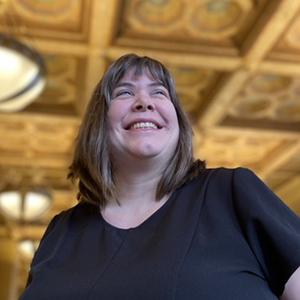by Sara Ring
Quick Summary
I recently attended my first ACRL (Association of College & Research Libraries) conference, which was held virtually in April. The conference theme was "Ascending into an Open Future," and packed with great content over four days. Many of the presentations I attended were excellent, thought-provoking, and aspirational. I will carry the information and ideas discussed with me for a long while. Here are just a few highlights from the presentations I attended.

I recently attended my first ACRL (Association of College & Research Libraries) conference, which was held virtually in April. The conference theme was "Ascending into an Open Future," and packed with so much great content over four days. Many of the presentations I attended were excellent, thought-provoking, and aspirational. I will carry the information and ideas discussed with me for a long while. Here are just a few highlights from the presentations I attended.
Keynote
Dr. Tressie McMillan Cottom, Associate Professor, University of North Carolina-Chapel Hill School of Information and Library Science
- Cottom argues that as librarians, we have a role, but it is also our professional obligation to bridge disciplinary conversations. She teaches students to think through the context, social implications, and political meaning of their professional work in libraries.
- One course Cottom teaches is The Networks of Racial Capitalism. It bridges the idea of platform (information) capitalism with structural inequality. Information capitalism articles, research, and discussion have picked up in recent years in the library community. It asks who are the players and what are the terms of living in a world dominated by technology platforms. Cottom bridges that idea with structural inequality - where some groups of people get more, and others get less of the world’s collective resources, by design and not by nature. The Academic Library is capable of helping us understand not just what information is, but also helping us think through the implications of information.
- Cottom discussed two related publications that I”ve put on my reading list. One is The Promise of Access: Technology, Inequality, and the Political Economy of Hope, by Dan Green. It looks at how technology beliefs and platforms end up transforming the public mission good of libraries when we adopt those technologies. The 2nd article discussed was titled Information has value: The political economy of information capitalism by Dave Ellenwood, from the open-access journal In the Library With the Lead Pipe. In Cottom’s own words the author sees the next logical step of information literacy is to move beyond just teaching people how to read information but to teach them to read around and through information.
- From these readings, Cottom shared with us what she is imagining lately. She asked what would it look like in the library community to develop a code of data rights for our academic spaces. In an information-based society, information derives its value from how we value the people who create it. Within the University, we rarely talk about the information rights that our stakeholders have. Creating a code of data rights solves the problem that information capitalism, if left unchecked, will continue to reproduce social inequalities. A set of data rights is more about just terms and conditions and governance policies. She thinks of data rights as being people-centered. What do people have a right to expect from the University as it relates to their data?
Reimaging Description for Libraries, Archives, and Special Collections: An Anti-Racist Approach
OCLC discussed a recent Andrew W. Mellon Foundation-funded initiative that will look at steps that libraries and archives can take to reimagine descriptive practices, tools, and workflows. You can watch a YouTube version of their presentation. Some highlights include:
- Many of our descriptive practices get in the way of our objective for inclusive spaces.
- For years we have used obsolete and racist terminology in our metadata. For example, the presenters discussed the recent documentary “Change the Subject,” which follows Dartmouth College students lobbying to replace the Library of Congress Subject Heading term “illegal aliens” with “Undocumented immigrants.”
- Addressing our systemic issues is not simple, or easy. It will take time and careful listening. Involving the communities that are the object of our descriptions is critical.
- Learn more about Reimagine Descriptive Workflows on the OCLC website.
Library Structures as Sites to Rethink: Using Established Workflows to Open a New Understanding of EDI Unit Culture
Library staff from Utah State University discussed their department and individual-level actions they’ve taken to promote equity, diversity, and inclusion, and also discussed barriers and opportunities.
- Racist ideologies and practices were used in creating our systems of higher education and are still persistent today.
- Unit level: They held summer unit retreats for goal setting. Using the University’s Strategic Plan, they came away with 4 equity, diversity, and inclusion goals. Staff created an EDI working group, discussed at unit meetings, and attended workshops together. They collaborated with the University Composition program. For example, in one English class they created a module that asks students to consider their topic from multiple perspectives to understand how marginalized groups might be impacted, including looking at their topic through an intersectional lens.
- Individual-level: As individuals, you have the power to change your personal sphere of influence. One speaker discussed an antiracist reading group she participated in that turned into a movie group. As an individual designing library instruction, they incorporated EDI into a library course. They asked students to consider a broad topic from the perspective of various identifies including race, class, gender, ability, sexual orientation, and education. They stressed the importance of seeking out marginalized and underrepresented scholars for citations. They wanted to move from having good intentions to be more intentional.
- Opportunities: One idea they are considering is holding a library inclusivity forum. Units can share work they’ve engaged in related to EDI. Another opportunity they discussed is the EDI interim task force. The 2 goals of this task force are to initiate training and conversations around developing a library land acknowledgment and to create an internal survey to better understand how the library’s policies/practices are hindering or supporting EDI.
- Barriers: There are various experiences and comfort levels at the library with this work. There was more of a disconnect due to the pandemic over the past year.
